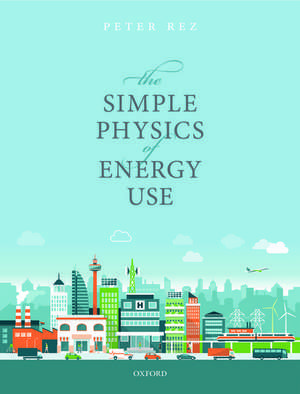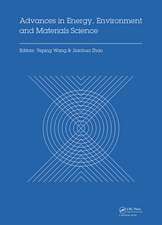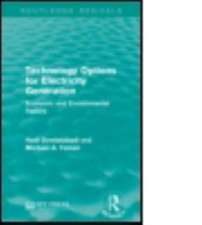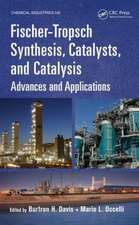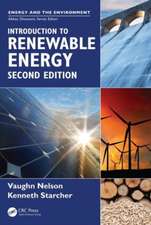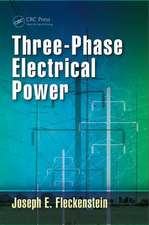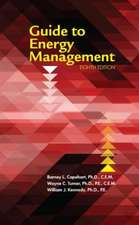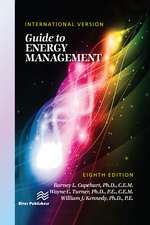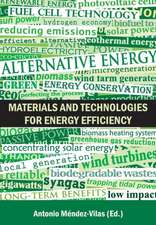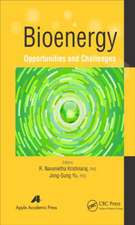The Simple Physics of Energy Use
Autor Peter Rezen Limba Engleză Paperback – 20 sep 2017
| Toate formatele și edițiile | Preț | Express |
|---|---|---|
| Paperback (1) | 324.43 lei 31-37 zile | +33.88 lei 6-12 zile |
| OUP OXFORD – 20 sep 2017 | 324.43 lei 31-37 zile | +33.88 lei 6-12 zile |
| Hardback (1) | 657.06 lei 22-36 zile | |
| OUP OXFORD – 20 sep 2017 | 657.06 lei 22-36 zile |
Preț: 324.43 lei
Nou
Puncte Express: 487
Preț estimativ în valută:
62.08€ • 64.99$ • 51.37£
62.08€ • 64.99$ • 51.37£
Carte tipărită la comandă
Livrare economică 26 martie-01 aprilie
Livrare express 01-07 martie pentru 43.87 lei
Preluare comenzi: 021 569.72.76
Specificații
ISBN-13: 9780198802303
ISBN-10: 0198802307
Pagini: 304
Ilustrații: Over 160 b/w illustrations
Dimensiuni: 189 x 246 x 15 mm
Greutate: 0.64 kg
Editura: OUP OXFORD
Colecția OUP Oxford
Locul publicării:Oxford, United Kingdom
ISBN-10: 0198802307
Pagini: 304
Ilustrații: Over 160 b/w illustrations
Dimensiuni: 189 x 246 x 15 mm
Greutate: 0.64 kg
Editura: OUP OXFORD
Colecția OUP Oxford
Locul publicării:Oxford, United Kingdom
Recenzii
Despite the considerable breadth of the book, if we zoom in on specific topics, there is quite a bit of detail... Opening up to nearly any page, there is a pairing of the simple physics and its application, often with very specific examples.
Rez takes a practical, physics-based approach to answering some of the most challenging questions about energy use and what we should be doing to increase sustainability, and provides a thorough quantitative analysis of the most important energy policy challenges we face.
This is an excellent primer for readers with limited science backgrounds. Overall, it is an excellent resource for undergraduate courses on energy. RECOMMENDED.
This groundbreaking book asks, and answers, key questions about energy use and carbon reductions including, is it realistic to eliminate carbon emissions? Can renewables (e.g. solar and wind) ever take over from fossil fuels in supplying all the energy we need? How long does it take for a given source of energy (e.g. wind, solar, nuclear) to produce and return the energy used in its manufacture? How has cheap natural gas from fracking changed the global energy situation? This book is a "must read" for all those interested in global warming, carbon reductions and energy use. It should have priority on the reading lists of policy makers, scientists, engineers, politicians, journalists, school teachers, and the general public. If you can only buy one book this year on global warming and energy use, buy this one!
This book encompasses all energy uses and sources, and is a very helpful aid for both students and policy makers. It is rather unique in that the equations and figures are derived starting from fundamentals. And it sticks to the facts, avoiding debilitating pessimism as well as unrealistic over-optimism about future energy and environmental options.
Six years ago when asked to devise a course on present and future energy systems for engineers, I would very much have liked to have this book to hand. Peter Rez has a primarily US focus but with examples from around the world. He draws the conclusions that put first generation renewable energy technologies firmly in their place -- suitable for low density communities that are remote and off grid, and not an answer to the world's generation of carbon dioxide. The book is very clearly written, suitable for any undergraduate, and it should be required reading for any energy policy analyst.
Rez takes a practical, physics-based approach to answering some of the most challenging questions about energy use and what we should be doing to increase sustainability, and provides a thorough quantitative analysis of the most important energy policy challenges we face.
This is an excellent primer for readers with limited science backgrounds. Overall, it is an excellent resource for undergraduate courses on energy. RECOMMENDED.
This groundbreaking book asks, and answers, key questions about energy use and carbon reductions including, is it realistic to eliminate carbon emissions? Can renewables (e.g. solar and wind) ever take over from fossil fuels in supplying all the energy we need? How long does it take for a given source of energy (e.g. wind, solar, nuclear) to produce and return the energy used in its manufacture? How has cheap natural gas from fracking changed the global energy situation? This book is a "must read" for all those interested in global warming, carbon reductions and energy use. It should have priority on the reading lists of policy makers, scientists, engineers, politicians, journalists, school teachers, and the general public. If you can only buy one book this year on global warming and energy use, buy this one!
This book encompasses all energy uses and sources, and is a very helpful aid for both students and policy makers. It is rather unique in that the equations and figures are derived starting from fundamentals. And it sticks to the facts, avoiding debilitating pessimism as well as unrealistic over-optimism about future energy and environmental options.
Six years ago when asked to devise a course on present and future energy systems for engineers, I would very much have liked to have this book to hand. Peter Rez has a primarily US focus but with examples from around the world. He draws the conclusions that put first generation renewable energy technologies firmly in their place -- suitable for low density communities that are remote and off grid, and not an answer to the world's generation of carbon dioxide. The book is very clearly written, suitable for any undergraduate, and it should be required reading for any energy policy analyst.
Notă biografică
Peter Rez completed his bachelors degree in Cambridge, and his PhD on Theory of Electron Scattering in Electron Microscopy, in Oxford. He has worked in industry (Kevex, VG Microscopes) on computer control and data acquisition in electron microscopy. He's been a professor at Arizona State since 1985. His interests have broadened to include general condensed matter theory as applied to batteries and strength of materials, radiation physics as applied to medical physics and radiation detectors, biomineralization and biophysics. This book came about from the author's interest in energy policy, another area where science and policy making collide.
